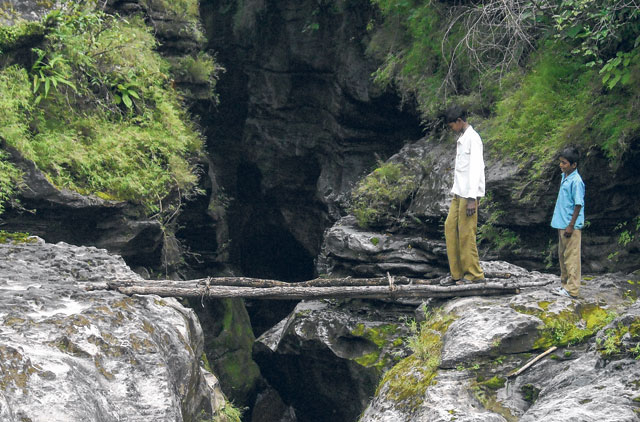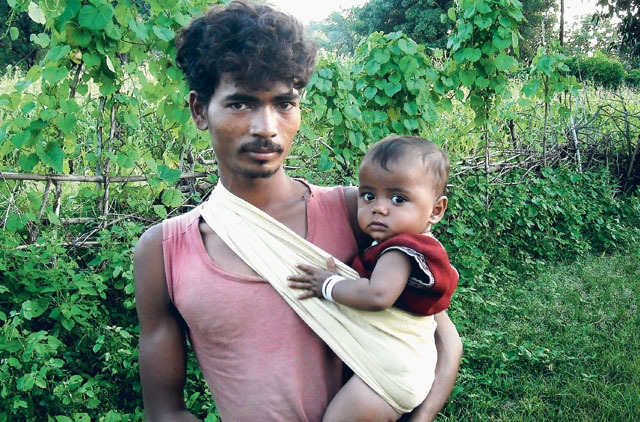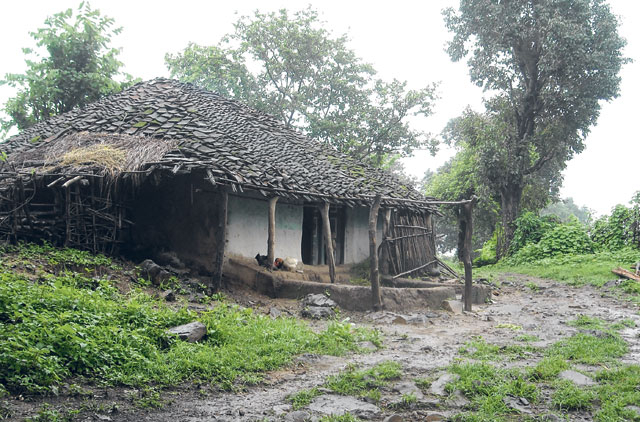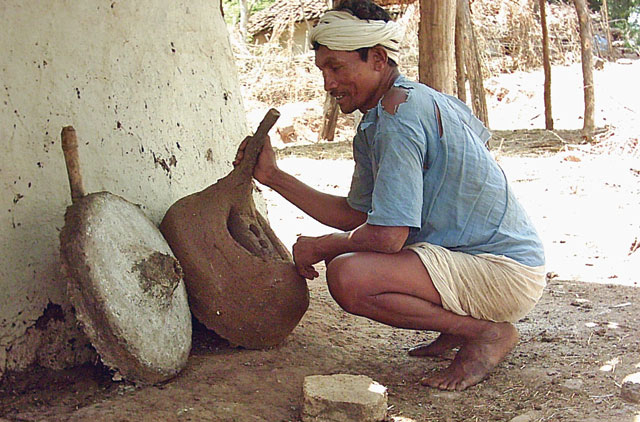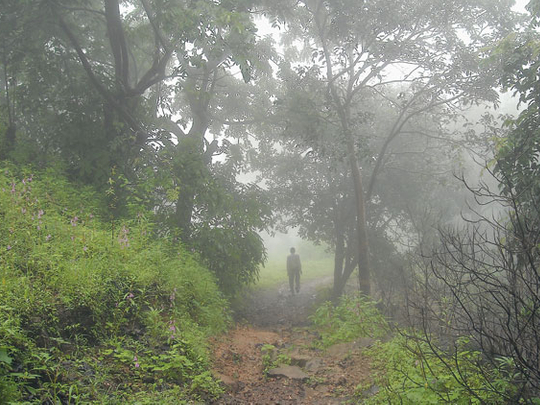
Patalkot in India's Madhya Pradesh state is the home of the Gond and Bharia tribes. It has been an isolated area where not even basic health care is available. Yet the local people are healthier than many in the developed world.
Patalkot is a deep valley situated above sea level, about 75 kilometres from Madhya Pradesh's Chhindwara district. Largely untouched by modern civilisation, the people of the 12 villages of Patalkot have lived a traditional lifestyle. They depend on the rich biodiversity of their forests for food, livelihood and medicines to treat common ailments.
However, the unique biodiversity of Patalkot is under threat as outsiders have started to exploit the forests.
Foreigners have moved in to take advantage of the area's extremely rich source of medicinal herbs, causing extensive damage to the environment.
And encroaching urban development — and Western culture — is also posing a threat, to the extent where one scientist studying the lifestyle of the Patalkot people says pressure from the outside world is making life torturous for the tribes.
The Gond and Bharia have always lived in harmony with nature. Their home, food, livelihood, culture, traditions and health have depended upon the wise utilisation of natural resources.
But modern development now taking place in the region is destroying the forests and the local people's traditional lifestyle and culture.
The Patalkot valley is in the Satpura mountain ranges. The Gaildubba village is considered the gateway to this unique and almost untouched world. Until recently it was believed that even the Sun's rays didn't reach the villages in the valley. This is not true but it is true that until the 1970s the Gond and Bharia tribes used to occasionally make swings from wild vines to travel to the outside world.
The main tribal villages in Patalkot include Rathed, Chimtipur, Gujja Dongri, Sahrapachhgoal, Harra ka Chhar, Sukhabhand, Dhornimalni, Jhiran, Palni, Gaildubba, Gudi Chhatri, Gaildubba-kariyam and Ghana.
It wasn't until 1980 that the government built the area's first cement stairs to help people reach the Rathed village.
One must descend to a depth of about 1,200 to 1,500 feet to reach any village in Patalkot.
The valleys are so deep it is difficult to see them from above and it starts getting dark in the villages from as early as four in the evening.
The people of the Bharia tribe have been living in Patalkot for centuries and their lives for many years have been unaffected by the changes taking place in the modern world.
About 2,500 people, who follow a distinctive way of life, live here.
The government has spent billions of rupees trying to develop the area but so far the end result has been nil. Special plans were prepared to help the Bharia tribe develop while conserving their culture at the same time. However, the Bharias have not entered mainstream society and their traditional knowledge of herbs did not reach the outside world until recently.
The local people of Patalkot hold great faith in the bhumka (local herbal healer) and the guniya.
While guniyas have deep knowledge of herbs and medicinal plants, bhumkas are considered experts in marak tarak tantra-mantra or magic power. Bhumkas are said to be able to cure a person of his or her illness by just examining the pulse.
Mayilal, a practising bhumka, says: "We are illiterate people but we can study a person's heart. We release water in the name of God after studying a person's heart. This cures the disease."
Mayilal believes mantras spoken from the heart are effective remedy and herbs cure diseases immediately.
The herbs found in Patalkot are rare and generally not found in other parts of the country. It is for this reason that many private companies, in collusion with foreign firms, have moved into the area.
The rare herbs of Patalkot are being sold around the world on the internet and locals say the government has failed to check what has become the reckless exploitation of the area's natural wealth. Commercial activity has risen alarmingly and Patalkot's treasure of herbs and medicinal plants is being plundered.
Microbiologist Dr Deepak Acharya, the executive director of a herbal company based in Ahmedabad, has published several articles on the threats facing Patalkot. He is working to document the indigenous knowledge of the bhumkas.
"It is the need of the hour to provide basic facilities to the tribal communities of Patalkot in a properly managed way. Migration should be stopped completely so that the culture and rituals of tribals of the region remain alive," Dr Acharya says.
"The culture of these people should be safeguarded and not killed. The system of curing disorders should not be exploited to the maximum.
"The government should take initiatives for employment opportunities for the tribal people.
"Funding facilities should be provided to them for cultivating their fields and use of wasteland and also for water management. The government should establish an agency for collecting forest produce brought by tribals so that they can get the actual price."
Traders have become rich by selling Patalkot's herbs. As a result, many herbs are on the brink of extinction but the forest department just looks the other way, he says.
Dr Acharya feels the arrival of outsiders has visibly affected the lifestyle of the Bharia tribe. Instead of dancing and swaying to the rhythm of dhol or other traditional tribal musical instruments, tribals today dance to the tunes of Western music.
Dr Acharya says: "Biotic pressure from the outside world has made life difficult in Patalkot. Government bodies sanction different kinds of funds from time to time for the uplift of the tribals in Patalkot but the funds never reach the tribals. The misuse of these sanctioned funds is a matter of worry as the life of tribals is still in a pathetic condition. The economic growth of the area and development claimed so far are zero."
The scientist says the younger generation of Patalkot has forgotten its traditional folk music. The craze for music from modern films has increased to such an extent that traditional folk music has become a thing of the past for these youngsters.
The traditions of the Bharia tribe are in jeopardy from the increasing influence of outside as traders and contractors exploit the region's priceless herbal wealth.
Elderly Bharias say they believe the reckless exploitation of Patalkot's rare herbs must stop if the unique identity of the area is to be protected. They are also worried about the threat to the tribal traditions posed by increasing urban influence.
To reach Patalkot's Jad village one must negotiate the footpaths that pass through hilly, dense forests. It is difficult to find open land in this region.
Takshila lives with her family in Jad. They own a small farm where they grow vegetables and collect chironji (Buchanania lanzan), mahua (Madhuca indica) and honey from the forest. They have access to Patalkot's abundant supply of underground water.
Takshila says: "We don't need vehicles or TV. We are happy without them."
But she is apprehensive about the presence of outsiders who keep coming to her village. She is also clearly uneasy about the foreigners.
Patalkot has a unique economy. Pratap Bharti, a member of the Bharia tribe who lives in the village of Sidholi, says more than 250 types of medicinal plants are found in the forests of Patalkot. He says the medicinal herbs are used by locals to treat 42 types of diseases.
Dr Ajay Khare of Madhya Pradesh Vigyan Sabha, which has been working in this area since 1997, says Patalkot's traditional health system is very important because in the rest of the world, people have to spend a lot on health services. While the tribals make use of their traditional knowledge to stay healthy, people belonging to so-called mainstream society spend a large part of their income on health services.
Dr Khare says he is endeavouring to make a systematic and scientific record of Patalkot's traditional knowledge of plants and herbs. "In Patalkot we learn how important a nature-based economy could be for the society," he says. For example, mahua is not only used to prepare beverages but is also a source of nutrition and an important food source.
Dr Khare says studies undertaken by Vigyan Sabha in the past 12 years have revealed that mahua is an important source of food and income for the people of Patalkot.
Panch (village council leader) of Rathed panchayat, Bhaglu Bharti, says he has witnessed many changes in the past 15 years. Until recently there were no roads in and out of Patalkot, which prevented him from taking his wife to hospital when she had complications giving birth, he says.
It was then the people of Patalkot decided to build a road — with or without government help.
So the villagers began to build — on the same day they celebrated Republic Day for the first time, on January 26, 1998, in Gaildubba village. Before 1998, neither Republic Day nor Independence Day was celebrated in the village. However, Bharti says he is concerned that the local lifestyle is being changed by increasing interference from the outside world.
He says the younger generation doesn't appear to be interested in traditional knowledge and many people are now visiting cities — which has led to a growing need for money.
Bharti says: "Broadly speaking, people only need money to fulfil about a third of our needs. But it appear that this is about to rise rapidly because of the increasing presence of contractors and businessmen who have arrived with the area's growing development."
The government has encouraged development, which is destroying the forests, he says. He fears the area's biodiversity and the Patalkot traditional system of healing with herbs will vanish — along with the forests.
It is ironic that the forest department and the contractors employ tribal people to cut the forests down, he says.
But the difficulties don't stop there. Tekchand of Sidhauli says he worked for five months on a dam project and was never paid. He says the tribal people's trust in others has been shattered by a corrupt and dishonest system that is encroaching on their way of life. And in the past two years, two persons in Patalkot have died of tuberculosis. Malaria is also rising.
Bharti says the most meaningful development for the Patalkot valley would be schools, health care centres and roads — plus the tribal people's ability to claim their right to their area's natural resources.
There is only one primary health care centre in Gaildubba village and it isn't functioning properly.
"We don't want to abandon these forests because we love the forests and this place," he says.
Sachin Kumar Jain of the Right to Food Campaign, a non-government organisation working in the area, says the government should make every effort to safeguard the rich sources of herbs and the forests in the Patalkot area.
"The government should also help preserve the tribal people's culture. Efforts should be made by the government to improve health infrastructure in the area. Here people suffer in the absence of proper medical facilities," Jain says.
Shuriah Niazi is a writer based in central India.


